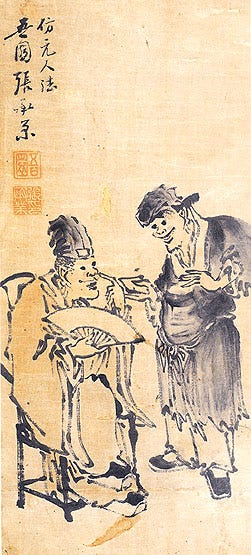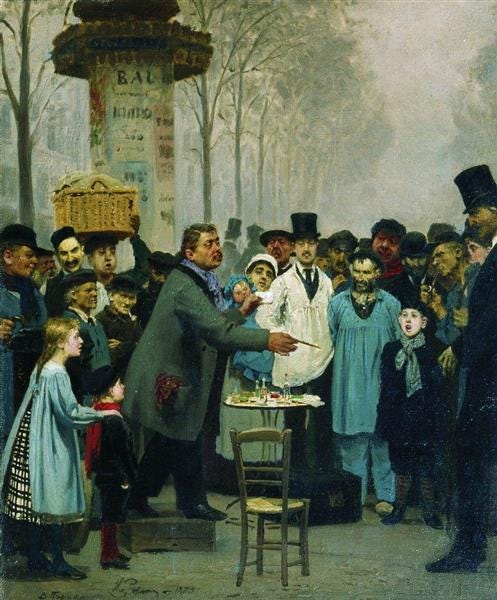Main Character Vibes
A Review of Peter Brooks's Seduced by Story: The Use and Abuse of Narrative

Here is a quick experiment: open any essay or piece of long-form journalism in a magazine or popular website and see how it begins. Go ahead and open a few tabs if you need to. I just trawled through the RSS feed of one popular magazine I subscribe to, which shall remain unnamed, and no less than five out of ten articles began with what might be called an attention-grabbing, context-free anecdote.
A man stands on a literal precipice, gazing at the long drop below and wondering how he got there; a Ukrainian veteran reflects on how he lost his arm in the fighting around Mariupol; tabloids froth and fume as Westminster Cathedral is mysteriously closed on a bright spring day. Before we can get into any of the reporting or analysis, see the bigger picture, the author must lead us, ritualistically, through a story.
This isn't a bad thing, necessarily. I do this all the time in my own essays. I teach my students to try it, with varying results. Obviously journalists do it, especially because their editors often demand it. Great novelists practice a form of it too when they open their books with sentences like “As Gregor Samsa awoke one morning from uneasy dreams he found himself transformed in his bed into a gigantic insect” or "Many years later, as he faced the firing squad, Colonel Aureliano Buendía was to remember that distant afternoon when his father took him to discover ice." The Odyssey begins in the middle of the journey, and Breaking Bad opens with a middle-aged chemistry teacher standing in the New Mexican desert, dressed in his underwear and clutching a pistol.
Still, the technique can be abused, especially when it is overused to the point that readers recognize when you're doing it. "Readers of the [New York] Times have noticed," Peter Brooks writes, "that nearly every article now begins, often tediously, with an anecdote leading in to the substance of the subject." This observation comes in the middle of a longer passage reflecting on the case of a Times reporter led astray from regular fact-checking responsibilities by the prospects of her source's juicy, tantalizing stories. As a Times reporter admits: “The paper is in the midst of an evolution from the stodgy paper of record into a juicy collection of great narratives, on the web and streaming services.”
Everybody, these days, seems interested in great narratives, especially on the web and streaming services, but also more broadly in politics, markets, and public life. Peter Brooks, professor of literature and author of Seduced by Story: The Use and Abuse of Narrative, calls it nothing less than "a narrative takeover of reality". He would know: Brooks literally wrote the book on narratology four decades ago with Reading for the Plot: Design and Intention in Narrative, giving narratology a permanent place in university literature departments everywhere. Much of his work has focused on how the rhythms and techniques of storytelling help us make sense of the world, whether for good or for ill.
Lately, Brooks figures, narratives have been more used for ill than for good. Storytelling techniques are being used more deliberately and more often by governments, businesses, and hucksters to better sway the course of our minds and our wallets, advancing their own interests at our expense. Brooks started noticing it early in the administration of George W. Bush, when the new president was showing off his future war-criminal cabinet members to the world in terms of press-friendly anecdotes showing their character and personality, rather than presenting their CVs and letting the public reach its own conclusions.
Brooks encounters self-help books claiming that “every problem in the world can be addressed—solved, made bearable, even eliminated—with better storytelling." Apparently, taking control of your personal and business narratives “should give you tools to make more money, increase cooperation, and decrease resistance in any situation.” Enron, he notes, did an excellent job of spinning stories around itself to conceal its moral and financial hollowness. Looking at recent headlines, one thinks of Theranos or FTX, which turned out to be selling not so much a medical device or cryptocurrency, but rather elaborate fictions about them. Even a box of cookies on Brooks's desk promises to tell him "Our Story" (no doubt one that doesn’t bring up how much corn syrup is in the cookie, or if its chocolate comes from slave labor).
What we need, Brooks thinks, is a greater sensitivity to how storytelling can be used to part us from our goods and our senses. He writes: "This narrative takeover—what it means, how to think about it, and how to provide a more intelligent account of what narrative is and does—motivates me here."
Based on this opening chapter, you'd expect Seduced by Story to be a kind of tour through our politics, markets, and media, defusing story-based bullshit through careful reading and healthy skepticism. This is how the New York Review Books Classics presents it in their marketing copy, and how the book has been taken up in its surprisingly robust media coverage. I would have gladly read that book, recommended it to my friends, and taught it to my students.
Instead, Brooks turns immediately toward nineteenth century realist novels and psychoanalysis. These just so happens to be Brooks's academic specialties. This is a mean trick. You come for the analysis of an urgent political question, and find instead that you are now stuck in a close-read of Henry James. The idea seems to be that if we eat our vegetables and read Henry James, we will be less susceptible to exploitative storytelling.
To be clear, I like Henry James. I think we can learn a lot by reading old novels with care and attention. But it beggars belief to think that anybody who 1) reads academic monographs that 2) warn us about unreliable narration by 3) analyzing second-tier Henry James novels needs to be told that 4) storytellers often shape their narratives towards particular, self-serving ends. Brooks is going to great lengths to demonstrate a point that his audience already knows.
But speaking of self-serving narration, it is very, very hard not to laugh when Brooks insists, as he does several times, that "the novel has become the overwhelmingly dominant form of our modernity." In fact, I did laugh when I read that. It's the kind of thing you can only write with a straight face when you've been living the rarified air of Ivy League academia since 1959, as Brooks has. The rest of us live in a modernity where half of all American adults read below a 9th grade level and finish fewer than six books a year. Novels are not, in any way, overwhelmingly dominant except perhaps in our landfills and in a few shrinking university departments.
This points to a more serious problem in Brooks's approach: novelistic techniques from the 19th century may not be the most salient approach for narratology in the United States in 2022. Besides his introduction and an illuminating chapter on storification in the legal system, there is almost nothing in Seduced by Story about political science, advertising, the entertainment industry, cable news, and social media. The internet itself barely gets a mention in the entire book, except for one or two desultory gestures at memes.
I doubt very much, for instance, that Brooks has heard much about Main Character Energy. Like most new words, it comes from teenagers on TikTok, and has a double valence. On the positive side, MCE is the kind of brash confidence that comes from knowing that you are the main character in the story of your life, and that even if something bad is happening to you, it is no doubt put in your way by a caring author who knows you will overcome it. On the other hand, MCE is also invoked to satirize that mindset, which tips so easily into toxic narcissism. Not everybody can be a main character, after all. That’s why many others, knowing that they lack MCE, instead call themselves NPCs—non-player characters, in video game parlance. The story that they tell themselves, only half-sarcastically, is that they only exist as background dressing for other, more important people. They are Rosencrantzes and Guildensterns, batting questions at each other while they wait for Hamlet to show up.
I bring up main character energy not to disprove anything that Brooks is saying, but only to suggest that literary theory and psychoanalysis don’t say very much about the strange, metastasizing storyfication of our lives and world. A real history of the narrative takeover would need more room to consider cable news, QAnon, Google AdSense, social media, pyramid schemes, political lobbying, corporate marketing outlays, and a thousand other sources of cant and obfuscation. Old books can tell us plenty about what we have lost, or what to watch out for in the stories that swarm all around us. But they cannot tell us where we are, and why we are here.
To seek causes and solutions to our present narrative overload in Henry James is like restricting the search for your keys to the light under the streetlamp. There is a better, more insightful story to tell about the stories we are being told, but it lies in the dark, where cable news is broadcast and memes are made.
From the Archives
Like everybody else who writes, I strongly considered writing a piece on ChatGPT and the dizzying rise of AI writers in recent weeks. But then I remembered that everybody else is writing about ChatGPT and I wouldn’t have much to say about it that wasn’t already covered a dozen times by a hundred writers. One of this newsletter’s core commitments is to always, always, always strike when the iron is cold—preferably frozen solid, buried in the permafrost and long forgotten. I strive to be anti-topical. With that said, I also didn’t do ChatGPT because I already wrote about AI writers a few months ago.
And what the hell, here’s my best ChatGPT, based on getting the program to tackle various Monty Python jokes. They say these things don’t actually have intentions, but I swear that first line is there to let me know GPT gets the Life of Brian reference.
And that’s all for this week. Happy reading!





